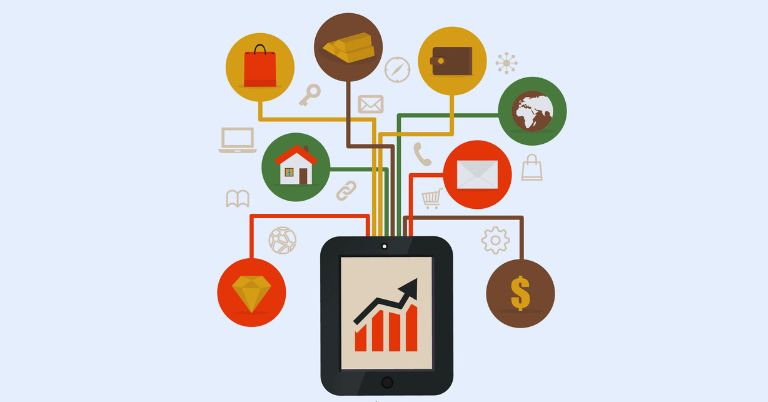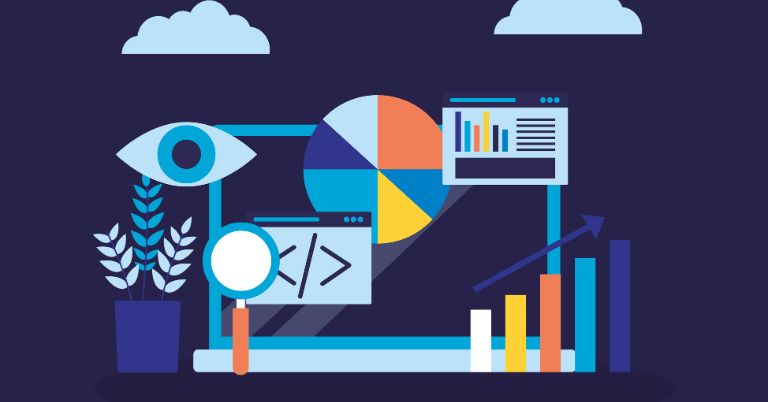Yes, data analytics is a promising career with high demand and growth opportunities. In today’s data-driven world, professionals skilled in analyzing data are highly sought after by companies across industries.
With the ability to uncover insights and make informed decisions, data analysts play a crucial role in driving businesses forward. They work with large volumes of data, using statistical techniques and visualization tools to identify patterns, trends, and opportunities. A career in data analytics offers competitive salaries, job security, and the chance to work on exciting projects that impact business strategy and decision-making.
As businesses continue to rely on data for critical insights, the importance of data analysts is only expected to increase, making it a rewarding career choice.
Let's See the Topic Overview
The Growing Demand For Data Analytics Professionals
Data analytics professionals are witnessing a surge in demand as companies increasingly rely on data-driven insights. With its immense potential and diverse applications, data analytics offers a promising career path for those seeking a dynamic and lucrative profession.
In today’s data-driven world, the demand for skilled data analytics professionals is on the rise. As businesses recognize the value of data in making informed decisions and gaining a competitive edge, the need for experts in data analytics continues to grow.
This section will explore the current and future job prospects in data analytics and the industry’s overall growth and reliance on data-driven decision-making.
Current And Future Job Prospects In Data Analytics:
- Increasing job opportunities: The field of data analytics offers a wide range of career opportunities across various industries. With the exponential growth of data generation, organizations are actively seeking professionals who can analyze and interpret data to extract valuable insights. This increased demand translates to a plethora of job openings for data analytics professionals.
- Lucrative salaries: Due to the high demand and scarce supply of skilled data analytics professionals, salaries in this field tend to be competitive. Organizations are willing to offer higher compensation packages to attract top talent. As you develop your skills and gain experience in data analytics, you can expect your earning potential to grow.
- Diverse career paths: Data analytics is not limited to a specific industry or role. Professionals in this field have the opportunity to work in various sectors such as finance, healthcare, marketing, e-commerce, and more. Additionally, you can specialize in different areas of data analytics, including data visualization, machine learning, or predictive analytics, allowing you to shape your career path according to your interests and strengths.
Industry Growth And The Need For Data-Driven Decision-Making:
- Expanding data ecosystem: The volume of data generated worldwide is expanding at an exponential rate. Every interaction, whether online or offline, generates data that can be analyzed for insights. This growth in the data ecosystem presents endless possibilities for businesses and underscores the need for data analytics professionals who can make sense of this vast amount of information.
- Enhanced decision-making: Organizations are increasingly relying on data-driven decision-making to gain a competitive advantage. By leveraging data analytics, businesses can uncover patterns, trends, and correlations that traditional methods may overlook. Data-driven insights enable companies to make informed decisions, optimize processes, identify new opportunities, and mitigate risks.
- Emerging technologies: As technology advances, so does the field of data analytics. Innovations like artificial intelligence, machine learning, and big data processing techniques have transformed the way organizations approach data analysis. The integration of these emerging technologies with data analytics has further fueled the demand for professionals who can harness their power to unlock valuable insights.
The growing demand for data analytics professionals is driven by the increasing job opportunities, lucrative salaries, and diverse career paths that the field offers. Furthermore, the expansion of the data ecosystem, the need for data-driven decision-making, and the integration of emerging technologies continue to propel the demand for skilled data analytics professionals.
As organizations continue to prioritize data analysis to gain a competitive edge, a career in data analytics presents a promising outlook for those interested in the field. Whether you are just starting or looking to advance your career, venturing into data analytics can open doors to a world of opportunities.
Is Data Analytics A Good Career In The Current Job Market?
Data analytics is a promising career choice in the current job market. With the increasing demand for data-driven insights, professionals in this field are highly sought after for their skills in analyzing and interpreting complex information to drive business decisions.

Overview Of The Job Market For Data Analytics Professionals:
Within the rapidly evolving job market, data analytics has emerged as a highly sought-after career path. As the world becomes increasingly data-driven, organizations across various industries are placing greater emphasis on extracting value from the vast amounts of data they generate.
This has led to a significant surge in demand for skilled data analytics professionals who possess the ability to derive meaningful insights from complex datasets. Whether you are a seasoned professional or just starting your career, the field of data analytics offers countless opportunities for growth and advancement.
The Increasing Demand For Skilled Data Analysts In Various Industries:
The demand for skilled data analysts is on the rise across multiple industries. Here are some key factors driving this trend:
- Big data revolution: With the advent of technology, data is being generated at an unprecedented rate. Organizations need professionals who can effectively analyze and interpret this data to make informed decisions.
- Business intelligence: The ability to make data-driven decisions has become crucial for companies to gain a competitive edge. Skilled data analysts play a pivotal role in providing valuable insights that drive growth and efficiency.
- Marketing and customer insights: Data analytics helps companies understand their customers better and devise effective marketing strategies. By analyzing customer behavior, preferences, and trends, data analysts contribute to creating targeted and personalized campaigns.
- Healthcare and pharmaceuticals: In the healthcare sector, data analytics is used to improve patient care, optimize hospital resources, and streamline operations. Additionally, pharmaceutical companies rely on data analysis to enhance drug development processes and clinical trials.
- Finance and banking: Financial institutions leverage data analytics to detect fraud, manage risks, and optimize investment strategies. Data analysts are crucial for uncovering patterns and trends in financial data while ensuring compliance with regulations.
Job Security And Salary Potential In The Field Of Data Analytics:
Apart from experiencing a surge in demand, data analytics also offers excellent job security and attractive salary potential. Here are some key points to consider:
- Growing opportunities: The field of data analytics is expected to witness continuous growth for years to come. The increasing reliance on data-driven decision-making across industries ensures a stable and growing job market for data analysts.
- Competitive salaries: Skilled data analysts are highly valued and are therefore compensated accordingly. The salaries of data analytics professionals are typically well above average, reflecting the importance and scarcity of their skills.
- Transferable skills: Data analytics skills are applicable across industries, making professionals in this field highly adaptable. This versatility provides added job security, as data analysts can leverage their skills in different sectors and easily transition to new roles and responsibilities.
- Career progression: The field of data analytics offers a clear career path with ample opportunities for advancement. As you gain experience and expertise, you can move up the ladder into managerial or specialized roles, boosting your earning potential and career growth.
Data analytics is a rewarding career choice in the current job market. With the increasing demand for skilled professionals, attractive salaries, and job security, data analytics offers a bright future for those willing to embark on this exciting journey.
The Power Of Data Analytics In Business
Data analytics is an excellent career choice due to its potential to help businesses make informed decisions and gain a competitive edge. As companies increasingly rely on data-driven insights, professionals proficient in data analytics skills are in high demand for their ability to extract valuable information from vast amounts of data and drive strategic decision-making processes.

Data analytics has become an integral part of modern businesses, revolutionizing the way organizations operate and make decisions. The power of data analytics lies in its ability to extract valuable insights from large volumes of data, enabling companies to drive growth and achieve success.
In this section, we will explore the role of data analytics in driving business growth and success, how it helps organizations make informed decisions, and provide examples of successful data-driven companies and their impact.
The Role Of Data Analytics In Driving Business Growth And Success:
- Companies can leverage data analytics to identify trends and patterns, making it easier to understand customer behavior and preferences.
- By analyzing data, businesses can optimize their operations, drive efficiency, and reduce costs.
- Data analytics helps companies gain a competitive edge by identifying market opportunities and predicting future trends.
- It enables organizations to personalize their marketing and sales strategies, improving customer engagement and satisfaction.
- With insights from data analytics, businesses can develop innovative products and services that meet changing market demands.
How Data Analytics Helps Organizations Make Informed Decisions:
- Data analytics provides actionable insights that guide decision-making at all levels of an organization.
- By analyzing data, companies can assess the effectiveness of their strategies and identify areas for improvement.
- It helps businesses measure key performance indicators (KPIs) and track progress towards their goals.
- Data analytics enables organizations to make data-driven decisions, minimizing risks and maximizing opportunities.
- It empowers decision-makers with real-time information, allowing them to respond quickly to changing market conditions.
Examples Of Successful Data-Driven Companies And Their Impact:
- Amazon uses data analytics to personalize customer experiences, recommend products, and optimize its supply chain, leading to increased customer satisfaction and loyalty.
- Netflix analyzes user data to create personalized movie recommendations and optimize its content library, resulting in a highly engaging and tailored user experience.
- Walmart utilizes data analytics to manage inventory, optimize pricing, and improve operational efficiency, leading to cost savings and better customer service.
- Procter & Gamble leverages data analytics to predict consumer demand, optimize production, and drive product innovation, enabling the company to stay ahead in the highly competitive consumer goods industry.
Data analytics has proven to be a game-changer for businesses across various industries. Its ability to uncover valuable insights, inform decision-making, and drive innovation has made it an indispensable tool for organizations seeking growth and success in today’s data-driven world.
By leveraging data analytics effectively, businesses can stay ahead of the competition, enhance customer experiences, and make informed decisions that contribute to long-term success.
Acquiring The Necessary Skills For A Data Analytics Career
Data analytics offers a promising career path thanks to its high demand across industries. Acquiring the necessary skills, such as programming, statistical analysis, and data visualization, can open doors to lucrative opportunities in a rapidly evolving field. Start your data analytics journey today!

Data analytics is a thriving field that offers promising career opportunities. As organizations become increasingly reliant on data to drive decision-making, the need for skilled data analysts continues to grow. To embark on a successful data analytics career, it is crucial to acquire the necessary skills.
In this section, we will explore the technical skills required for a career in data analytics, the importance of critical thinking and problem-solving abilities, and the role of continuous learning in staying up-to-date in the field.
The Technical Skills Required For A Career In Data Analytics:
- Proficiency in programming languages:
- Python: As a versatile language, Python is widely used in data analysis due to its extensive libraries, such as pandas and Numpy.
- R: Popular among statisticians, r offers a powerful set of tools for data manipulation and visualization.
- Data querying and manipulation:
- Sql: A fundamental skill in data analytics, SQL enables analysts to extract, organize, and manage large datasets efficiently.
- Excel: Proficiency in Excel, including data cleaning, pivot tables, and advanced functions, is essential for performing data analysis tasks.
- Statistical analysis and modeling:
- Descriptive statistics: Ability to use measures of central tendency, dispersion, and visualization techniques to explore datasets.
- Inferential statistics: Knowledge of hypothesis testing, confidence intervals, and regression analysis for drawing conclusions from data.
- Machine learning: Understanding of algorithms such as linear regression, decision trees, and clustering to develop predictive models.
- Data visualization:
- Tableau: Mastery of Tableau or other visualization tools to transform data into insightful charts, graphs, and dashboards.
- Data storytelling: Skill to present findings in a compelling and visually appealing manner to non-technical stakeholders.
The Importance Of Critical Thinking And Problem-Solving Abilities:
Data analysts must possess strong critical thinking and problem-solving skills to extract meaningful insights from complex datasets. Here’s why these abilities are crucial:
- Identifying patterns and correlations: Critical thinking enables analysts to identify relevant patterns and correlations that drive effective decision-making.
- Data-driven problem-solving: By applying analytical techniques, data analysts can evaluate problems, identify potential solutions, and recommend data-supported decisions.
- Root cause analysis: Critical thinking helps analysts uncover the underlying causes of issues by systematically examining data and exploring relationships between variables.
- Making data-driven decisions: By using their problem-solving skills, data analysts can synthesize information from various sources, interpret data findings, and make informed decisions.
The Role Of Continuous Learning In Staying Up-To-Date In The Field:
Data analytics is a dynamic field that constantly evolves with advancements in technology and methodologies. To ensure relevance and maintain a competitive edge, data analysts must embrace continuous learning. Here’s why it is essential:
- Adaptability to changing technologies: Continuous learning equips analysts with the ability to adapt to new tools, programming languages, and techniques as they emerge.
- Staying current with industry trends: By continuously learning, data analysts can keep pace with industry trends, gaining insights into the latest methodologies and best practices.
- Upskilling and specialization: Ongoing learning allows analysts to deepen their expertise in specific areas, such as data visualization, machine learning, or big data analytics.
- Professional growth and career advancement: Continuous learning demonstrates a commitment to professional growth, opens doors to new opportunities, and enhances career prospects.
Acquiring the necessary technical skills, along with fostering critical thinking and problem-solving abilities, are essential for a successful career in data analytics. Additionally, embracing continuous learning ensures that data analysts stay current in this rapidly evolving field, enabling them to thrive in their careers and contribute effectively to data-driven decision-making.
Tools And Technologies Used In Data Analytics
Data analytics offers a promising career path with a wide range of tools and technologies at its disposal. Professionals in this field utilize tools such as Python, R, Tableau, and SQL to analyze and interpret data, providing valuable insights for businesses.

This career choice is driven by the increasing demand for data-driven decisions in various industries.
Data analytics is a rapidly growing field that offers exciting career opportunities. As businesses become more data-driven, the demand for skilled professionals who can analyze, interpret, and derive insights from data continues to rise. In this section, we will explore some of the popular tools and technologies used in data analytics.
Introduction To Popular Data Analytics Tools Such As Python, R, And SQL
- Python: Python is a versatile and powerful programming language widely used in data analytics. It provides a vast array of libraries and frameworks such as pandas, Numpy, and Scipy, which make data manipulation, exploration, and analysis more efficient and effective. Python’s simplicity and readability make it an excellent choice for both beginners and experienced data analysts.
- R: R is another popular programming language commonly used by data analysts and statisticians. It is known for its extensive collection of statistical and graphical techniques, making it ideal for data exploration and visualization. R’s comprehensive packages, such as ggplot2 and Dplyr, enable analysts to manipulate and analyze data easily.
- SQL: Structured query language (SQL) is the foundation of data management and analysis. It allows data analysts to retrieve, filter, and manipulate data stored in relational databases efficiently. Sql’s declarative syntax makes it easy to write queries to extract meaningful insights from large datasets. Familiarity with sql is essential for working with structured data.
Understanding The Role Of Machine Learning And Artificial Intelligence In Data Analysis
- Machine learning: Machine learning algorithms enable data analysts to uncover patterns and make predictions based on historical data. It involves building models that can learn from data and improve their performance over time. By utilizing techniques like regression, classification, and clustering, data analysts can extract valuable insights and create predictive models to drive meaningful business decisions.
- Artificial intelligence: Artificial intelligence (AI) complements data analytics by utilizing algorithms and technologies to simulate human intelligence. AI enables the analysis of large volumes of complex data, providing deeper insights and automating decision-making processes. Techniques like natural language processing (NLP) and deep learning are used in AI-powered analytics systems to recognize patterns, understand text, and make intelligent predictions.
The Importance Of Data Visualization In Conveying Insights Effectively
- Data visualization: Data visualization plays a crucial role in data analytics, allowing analysts to present complex information in a visually appealing and easy-to-understand format. Visual representations like charts, graphs, and interactive dashboards help uncover patterns, trends, and outliers, making it easier to communicate insights to stakeholders. Effective data visualization enhances decision-making processes by enabling individuals to explore and understand the data visually.
Data analytics offers a promising career path for individuals interested in working with data and deriving insights. By leveraging popular tools like python, r, and sql, understanding the role of machine learning and artificial intelligence, and emphasizing data visualization, data analysts can effectively analyze and communicate actionable insights.
Career Paths In Data Analytics
Data analytics offers promising career paths with a high demand for skilled professionals. It provides opportunities to work with big data and make data-driven decisions, making it an excellent career choice for those interested in technology and problem-solving.
Overview Of Different Career Paths Within The Field Of Data Analytics
Data analytics is a rapidly growing field with various career paths that professionals can pursue. Whether you are interested in analyzing data to derive actionable insights, building complex models to predict trends, or enabling data-driven decision-making within organizations, there is a career path in data analytics that suits your skills and interests.
Here, we will explore three popular roles within the field of data analytics: data analyst, data scientist, and business intelligence analyst.
Data Analyst:
- Data analysts are responsible for collecting, organizing, and analyzing data to provide insights for business decision-making.
- They gather data from various sources, clean and transform it, and use statistical techniques to identify patterns, trends, and correlations.
- Data analysts often work with tools such as Excel, SQL, and Tableau to create visualizations and reports that communicate their findings to stakeholders.
- Strong analytical and problem-solving skills, knowledge of statistical methods, proficiency in programming languages like Python or R, and a solid understanding of data visualization are essential qualifications for a data analyst.
Data Scientist:
- Data scientists are advanced professionals who utilize their expertise in mathematics, statistics, and computer science to extract insights from complex datasets.
- They use machine learning algorithms and statistical modeling techniques to develop predictive models, solve business problems, and uncover hidden patterns in data.
- Data scientists work with large volumes of data, and they are skilled in programming languages like Python, R, or Java.
- A strong background in mathematics and statistics, knowledge of machine learning algorithms, advanced programming skills, and the ability to communicate findings effectively are vital for a successful data scientist.
Business Intelligence Analyst:
- Business intelligence analysts bridge the gap between data analysis and business strategy by providing actionable insights to support decision-making processes.
- They collect and analyze data related to market trends, customer behavior, and competitor activities, identifying opportunities for growth and improved performance.
- Business intelligence analysts are proficient in tools such as Power BI, Tableau, or Qlikview to create visualizations and dashboards for easy interpretation of data.
- Strong business acumen, strategic thinking, analytical skills, proficiency in SQL and data visualization tools, and the ability to translate data-driven insights into actionable recommendations are key qualifications for a business intelligence analyst.
Data analytics offers diverse career paths for individuals with a passion for working with data. Whether you choose to become a data analyst, data scientist, or business intelligence analyst, each role requires distinct skills and qualifications. So, if you have a knack for working with numbers, enjoy problem-solving, and have a keen interest in extracting insights from data, a career in data analytics could be a perfect fit for you.
Opportunities For Advancement And Growth In Data Analytics
Data analytics offers abundant opportunities for advancement and growth, making it an excellent career choice. With the increasing reliance on data-driven decision-making, professionals skilled in data analytics can expect a promising future in various industries. By honing their skills and staying updated with the latest technologies, individuals can carve a successful path in this thriving field.

The Potential For Career Growth And Advancement In The Field Of Data Analytics
Data analytics is a rapidly growing field with immense potential for career growth and advancement. As organizations across industries continue to recognize the value of data-driven decision-making, the demand for skilled data analysts is on the rise. Here are some key points to consider when evaluating the opportunities for growth in this field:
- Increasing demand: With the exponential growth of data generation, there is a continuous need for professionals who can analyze and interpret this vast amount of information. This demand ensures a steady stream of job opportunities in data analytics.
- Diverse industries: Data analytics has become integral to virtually every industry, including finance, healthcare, marketing, and retail. This widespread implementation across diverse sectors opens up a broader range of career options and the chance to specialize in various domains.
- Career progression: Starting as an entry-level data analyst, you can progress to more senior roles such as data scientist, data engineer, or business intelligence manager. With experience and additional skills, you can climb up the career ladder and assume leadership positions.
- Global reach: The skills learned in data analytics are not limited to a single geographic location. As businesses become increasingly globalized, data analysts have the opportunity to work with international clients and contribute to projects worldwide.
Continuing Education And Certification Programs For Professional Development
In a dynamic field like data analytics, keeping up with the latest trends and technologies is essential for professional growth. Fortunately, there are numerous continuing education and certification programs available to help you stay ahead. Here are a few ways to enhance your skills:
- Online courses: Many reputable platforms offer online courses specifically tailored to data analytics. These courses cover topics like statistical analysis, machine learning, and data visualization, enabling you to acquire new skills at your own pace.
- Professional certifications: Earning certifications in data analytics not only enhances your knowledge but also demonstrates your commitment to professional development. Certifications such as certified analytics professional (cap) or Microsoft certified: data analyst associate can boost your credibility and increase your chances of career advancement.
- Networking events and conferences: Attending industry conferences and networking events provides an excellent opportunity to connect with fellow professionals and experts in the field. These events often feature panel discussions, workshops, and keynote speeches, allowing you to gain insights into the latest industry trends and establish valuable connections.
- Collaboration and learning from peers: Engaging with the data analytics community through online forums, discussion groups, and social media platforms can facilitate knowledge sharing and collaborative learning. Exchanging ideas and experiences with peers can provide valuable insights and help you stay informed about industry developments.
Ways To Stay Ahead In The Rapidly Evolving Data Analytics Industry
The field of data analytics is constantly evolving, making it crucial to stay ahead of the curve to remain competitive. Here are some effective ways to stay at the forefront of the industry:
- Continuous learning: Adopt a mindset of lifelong learning to keep up with the rapid pace of change in data analytics. Stay informed about emerging technologies, tools, and techniques through reading industry publications, following thought leaders, and participating in online communities.
- Embrace automation and AI: As the field progresses, automation and artificial intelligence are playing an increasing role in data analytics. Familiarize yourself with these technologies and explore how they can augment your work. By leveraging automation tools and ai algorithms, you can enhance efficiency and gain a competitive edge.
- Data visualization skills: Developing proficiency in data visualization is essential for effectively communicating insights to stakeholders. Mastering tools like Tableau, Power BI, or Python libraries like Matplotlib and Seaborn can help you create impactful visual representations of data.
- Cultivate problem-solving skills: Data analytics is ultimately about solving complex problems using data. Refine your problem-solving abilities by engaging in real-world projects, actively seeking challenges, and honing your analytical mindset. Employers value professionals who can tackle intricate problems and provide actionable solutions.
- Soft skills development: In addition to technical expertise, developing soft skills such as communication, teamwork, and critical thinking is vital in the data analytics industry. These skills will enable you to effectively collaborate with cross-functional teams, convey insights persuasively, and adapt to changing project requirements.
By taking advantage of the opportunities for career growth, continuing education programs, and staying ahead of industry trends, you can thrive in the exciting and evolving field of data analytics.
Challenges And Potential Drawbacks Of A Data Analytics Career
Embarking on a data analytics career offers tremendous potential, but it also comes with its fair share of challenges. From the constant need to upgrade skills to handling complex datasets, individuals in this field must stay adaptable and up-to-date. Additionally, the dependence on technology and the potential for data breaches may present certain drawbacks.
However, with the right foundation and a passion for problem-solving, a data analytics career can be a rewarding and promising path to pursue.
Are you considering a career in data analytics? In today’s fast-paced digital landscape, data analytics has emerged as a promising field with immense potential. However, like any other profession, it comes with its set of challenges and potential drawbacks. It’s important to delve into these factors to gauge whether a data analytics career is the right fit for you.
Let’s explore some of the common challenges and potential drawbacks faced by data analytics professionals:
Common Challenges Faced By Data Analytics Professionals
- The complexity of data analysis: Data analytics involves handling large volumes of intricate data sets, which can be overwhelming and require strong analytical skills to make sense of the information.
- Data quality concerns: Ensuring the accuracy and reliability of data is crucial for effective analytics. Professionals often face challenges in dealing with incomplete or inconsistent data, which can hinder the accuracy of insights generated.
- Interdisciplinary knowledge: Data analytics encompasses a wide range of disciplines, including statistics, programming, and business knowledge. Professionals must continuously develop their skills in various areas to stay competitive in the field.
- Communication barriers: Data analytics professionals often need to communicate complex findings to non-technical stakeholders. Balancing technical jargon with clear and concise explanations can be a challenge, requiring effective communication skills.
The Need For Continuous Learning And Keeping Up With Technological Advancements
- Rapidly evolving technology: Technology is constantly advancing, and data analytics is no exception. Professionals must continuously update their knowledge and keep up with the latest tools, programming languages, and techniques to remain relevant in the industry.
- Demand for interdisciplinary skills: As data analytics integrates with business strategies, professionals need to develop skills beyond technical expertise. This includes understanding the business context, problem-solving abilities, and effective communication skills.
- Continuous learning culture: To excel in a data analytics career, individuals must embrace a lifelong learning mindset. Engaging in continuous learning through courses, workshops, and industry events is crucial for professional growth and staying ahead in the field.
Potential Drawbacks Such As The Pressure Of Working With Large Datasets
- Handling large and complex datasets: Data analytics often involves processing, cleaning, and analyzing massive amounts of data. This can create immense pressure, especially when tight deadlines are involved.
- Data security and privacy concerns: As data analytics professionals work with sensitive information, ensuring data security and privacy is of utmost importance. Protecting valuable data from breaches or unauthorized access can be a significant challenge.
- Ethics and biases in data analysis: Data analytics can be impacted by inherent biases, whether in the data collection process or the interpretation of results. Professionals need to be mindful of these biases and ensure ethical practices in their work.
A career in data analytics offers exciting opportunities, but it also comes with its fair share of challenges and potential drawbacks. By understanding and addressing these factors, aspiring professionals can make informed decisions about their career path. Embracing continuous learning, honing interdisciplinary skills, and staying updated with technological advancements are key steps toward success in the dynamic field of data analytics.
So, are you ready to take on the challenges and unlock the vast potential of a data analytics career?
Conclusion
Data analytics is undoubtedly a promising and rewarding career path for individuals who possess a passion for numbers and problem-solving. With the increasing demand for data-driven insights in every industry, professionals in this field can expect a wide range of job opportunities and competitive salaries.
The ability to gather, analyze, and interpret data is a valuable skill set that companies are actively seeking in order to make informed business decisions and gain a competitive edge. Moreover, the continuous advancements in technology and the rise of big data ensure that the demand for skilled data analytics professionals will only continue to grow.
It is evident that a career in data analytics offers stability, growth, and innovation, making it a great choice for those who enjoy working with data and seek to make a significant impact in today’s data-driven world. So, if you have a knack for numbers and a strong analytical mindset, pursuing a career in data analytics can be a smart and fulfilling choice.











![6-Month Local SEO Plan [Download Your Complete Proposal Template]](https://www.sajibroy.com/wp-content/uploads/2025/01/6-Month-Local-SEO-Plan-Download-Your-Complete-Proposal-Template.jpg)
